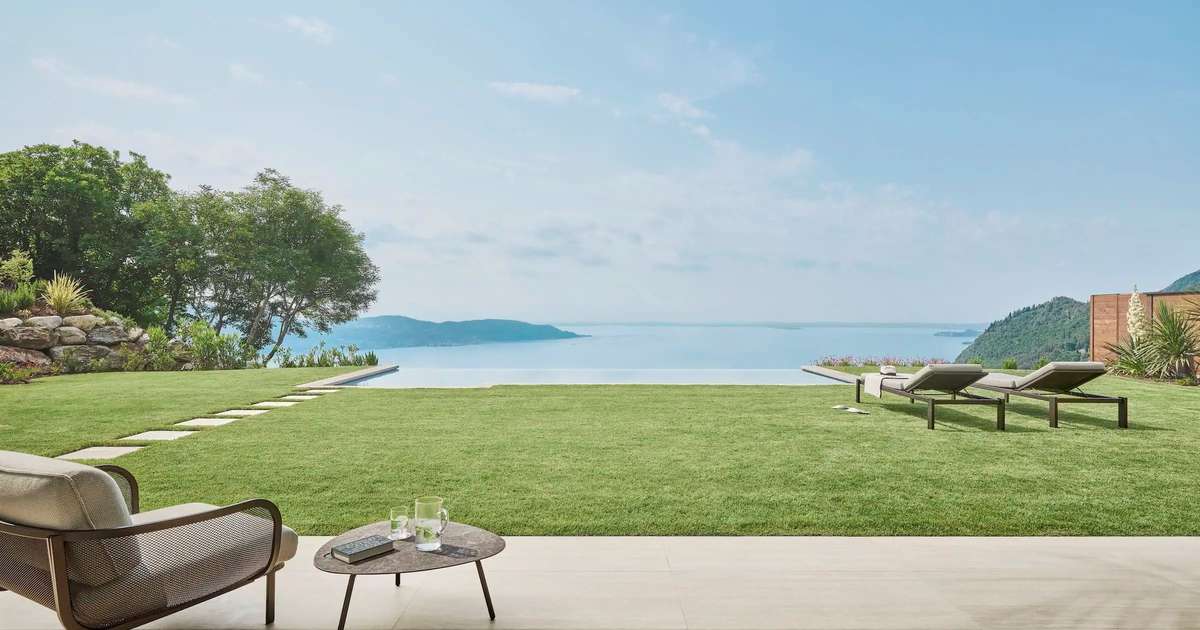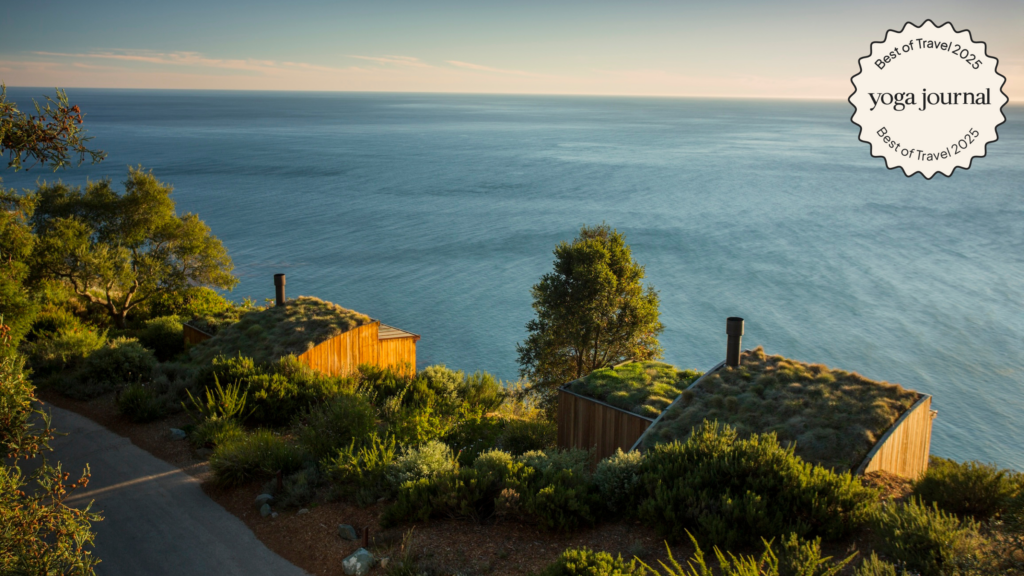
Heading out the door? Read this article on the new Outside+ app available now on iOS devices for members! Download the app.
While slowing down, unlocking a new perspective, and welcoming change are hallmarks of almost any travel, mindful travel prioritizes not only your well-being but that of the planet. And for an increasing number of sustainable hotels—and the people that stay in them—that ethos matters most.
With climate anxiety on the rise, mindful travelers feel that more sustainable experiences add value to their trips. According to Booking.com’s Sustainable Travel Report, 62 percent of travelers feel that they are the best version of themselves when they travel more sustainably, and that they take this positivity home with them. Staying rooted in your environmental values (and those of the places you stay) has also been found to boost optimism and even enjoyment as well as positive impact.
That said, the search for a well-meaning property can be time-consuming—endless hours spent scanning for eco credentials that align with your values without compromising comfort, self-care, and fun. To help steer you toward a more easeful and sustainable stay, we’ve unearthed some of the most innovative and intentional properties on the planet. Whether you’re seeking alpine retreats, wilderness lodges, or tropical hideaways, these escapes set the bar for sustainable hospitality.
13 Sustainable Hotels and Resorts Around the World
These destinations offer a holistic wellness getaway while keeping environmental footprints small.
1. Forestis (Brixen, Dolomites, Italy)
Located high in the Dolomites, this contemporary carbon-neutral, summit-level refuge with a two Michelin key rating is surrounded by unspoiled landscape and some of the most breathtaking views the world has to offer.
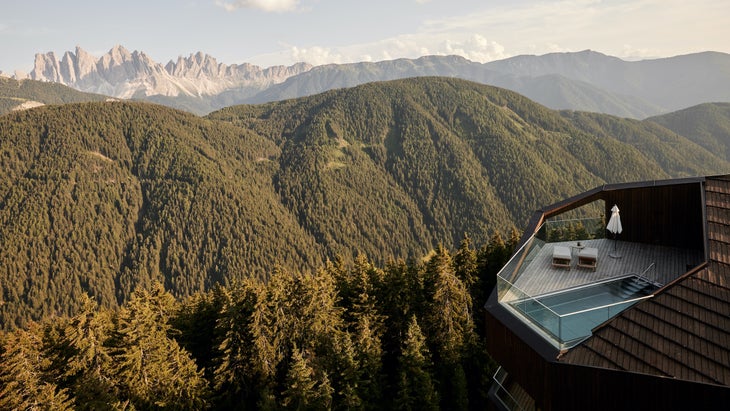 (Photo: Courtesy of Forestis)
(Photo: Courtesy of Forestis)
The Grounds: Forestis Dolomites integrates itself into the natural landscape. In keeping with the hotel’s commitment to sustainability, its construction preserved existing structures from its origins as a sanatorium, while the design focused on protecting the area’s ecology. Any felled trees were used for fences around the property, and for each tree lost two new plantings were made.
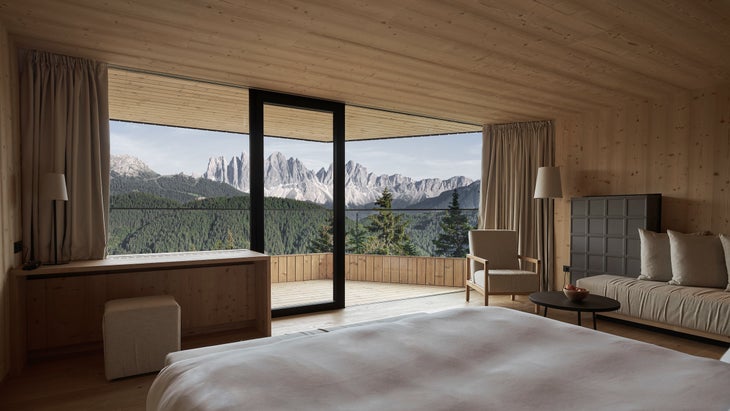 (Photo: Courtesy of Forestis)
(Photo: Courtesy of Forestis)
Eco Efforts: The entire hotel is powered by 100 percent renewable energy produced by a pellet heating system. Interiors were designed using locally sourced furnishings and environmentally conscious materials, such as South Tyrolean wood. The hotel has a zero-waste policy for food, packaging, and water pollution, and bath amenities are provided in large-format refillable vessels.
Wild Wellness: At 1,800 meters above sea level, the air is said to restore the body’s energy and vitality. This is a welcome complement to a spa rooted in the four elements, featuring treatments based on four trees: mountain pine, spruce, larch, and stone pine. Unique features of the extensive spa facilities include silence rooms as well as Wyda room (for “Celtic yoga”).
In the Kitchen: Local ecosystems and farmers supply ingredients for the sustainable hotel’s “forest cuisine” and the bar menu showcases drinks infused with essences from the surrounding woods.
Get Outside: There is ample opportunity for guests to explore the Puez-Geisler Nature Park on foot, skis, snowshoes, or two wheels, all while reaping the benefits of time spent outside.
Thoughtful Details: Each room comes equipped with a “no housekeeping” button—and each day a guest presses it, the hotel will plant a tree.
Check Availability at Forestis
2. Valsana Hotel (Arosa, Switzerland)
Located in the village of Arosa, a popular ski destination two and a half hours from Zurich, Valsana Hotel makes a sustainable base for mountain sports or year-round relaxation.
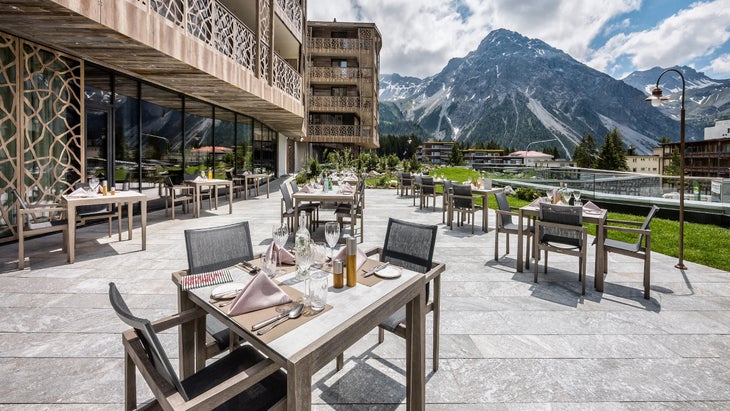 (Photo: Valsana)
(Photo: Valsana)
Eco Efforts: This carbon-neutral alpine retreat is recognized by Responsible Hotels of Switzerland and Green Globe certified, with architecture and interior design that leverages the latest technological innovation to minimize the property’s impact. This includes a cutting-edge “ice battery” that powers the hotel. Coupled with a sophisticated heat recovery system that captures and reuses waste heat, the battery has eliminated the need for any oil or electric heating. Minimizing single-use plastic is top of mind throughout the property, and bath amenities are provided in large-format refillable vessels.
Wild Wellness: The property’s “Moving Mountains” spa concept combines treatments designed to restore vitality and well-being while reconnecting with nature through unique offerings including meditation walks. Outdoor wellness experiences include expeditions to a spa under a waterfall, guided ice bathing, torchlit night walks, Kneipp treading (a practice involving stork-like walking in cold water), and more.
 (Photo: Valsana)
(Photo: Valsana)
In the Kitchen: In the hotel restaurant, chefs cook what nature has to offer, with a focus on regional produce that inspires a diverse menu complete with a variety of plant-based options.
Thoughtful Details: Enjoy a small secondhand library in each room.
Check Availability at Valsana
3. Heckfield Place (Hampshire, UK)
This restored 18th-century estate sits on more than 400 acres of secluded Hampshire countryside just an hour from London.
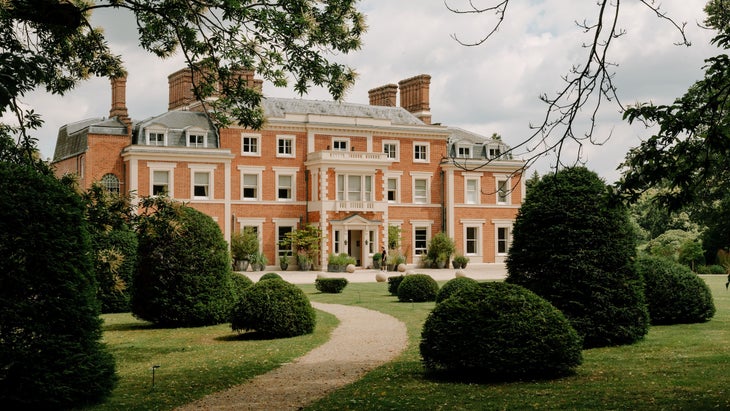 (Photo: Heckfield Place)
(Photo: Heckfield Place)
The Grounds: Every aspect of this sustainable hotel is intrinsically linked to the land. Heckfield Place considers nature across all of its operation with its chemical-free soil maintained with help from saddleback pigs (and their nutrient-rich fertilizer). Hundreds of fruit trees line the orchard, and temperature-controlled greenhouses propagate everything that goes into the garden.
Eco Efforts: No single-use plastic is found anywhere in the house, a policy that extends to its suppliers. Water is extracted from an onsite bore hole to reduce water costs, rainwater is collected for use on the estate, and biomass boilers burn wood pellets from a sustainable source for general heating. Oil waste from the kitchen is used to create biofuel to power its Land Rovers and farm equipment.
Wild Wellness: The property’s spa offers a variety of therapies, including outdoor movement classes, cold water immersion in the property’s lake, and “ecopsychology” (aka nature therapy coaching). The two-day “Heckfield Reset” is designed to reconnect you to the rhythms of the natural world and offer a reprieve from the pace of modern life.
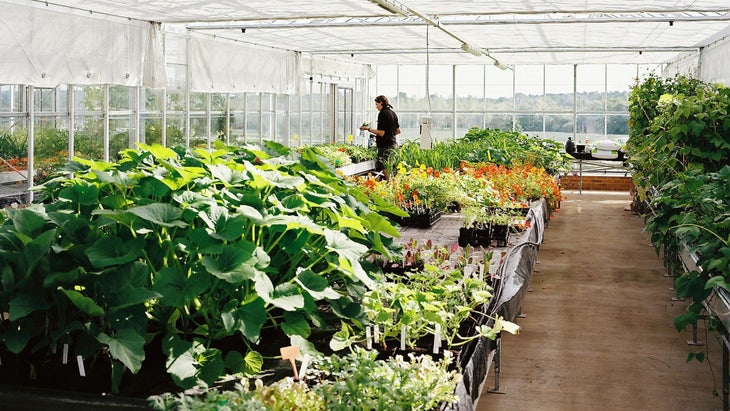 (Photo: Heckfield Place)
(Photo: Heckfield Place)
In the Kitchen: A certified biodynamic garden and organic farm serve as the heart of the estate, with a rotating crop of grains, an array of livestock, and an abundance of produce guiding the Michelin green star menus. The property’s dairy farm produces milk, cream, butter and yogurt for the house. And, in keeping with the sustainable hotel’s zero-waste pledge, produce that isn’t used in the kitchen goes back into the soil or into the zero-waste cocktail menu.
Check Availability at Heckfield Place
4. 1 Hotel Hanalei Bay (Kauai, Hawaii)
Verdant mountains preside over the lush valley of Hawaii’s famed “Garden Island,” where this hotel’s biophilic structures blend seamlessly into the cliffside landscape.
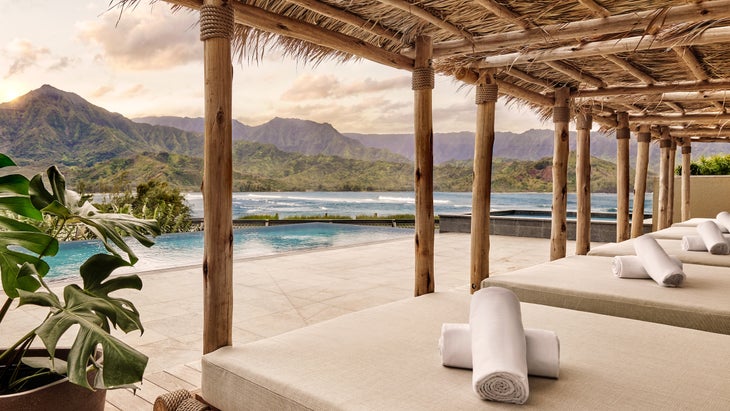 (Photo: AVABLU)
(Photo: AVABLU)
Eco Efforts: The 1 Hotel Hanalei Bay’s low-impact design incorporates an array of locally sourced natural materials, including teak joists, puka lava stone walls, ceilings hand-woven from abaca leaf, and floors fashioned from local black basalt. The furnishings are also all reclaimed through local partner RE-use Hawaii. The hotel is also optimized for energy efficiency and powered by green systems, and the “living” roofs insulate the building while reducing and filtering stormwater runoff. A rainwater harvesting system reduces outdoor water consumption by 97 percent, saving more than three million gallons of water per year by irrigating gardens. The hotel is committed to avoiding single-use plastics and eliminating waste, with TRUE Zero Waste certification currently in progress, targeting a 90 percent total waste diversion from Kauai’s landfill.
Wild Wellness: A spa menu of transformative wellness therapies includes treatments incorporating Hawaiian plant medicine, cryotherapy, hyperbaric oxygen therapy, meditation pods, floatation chambers, and more.
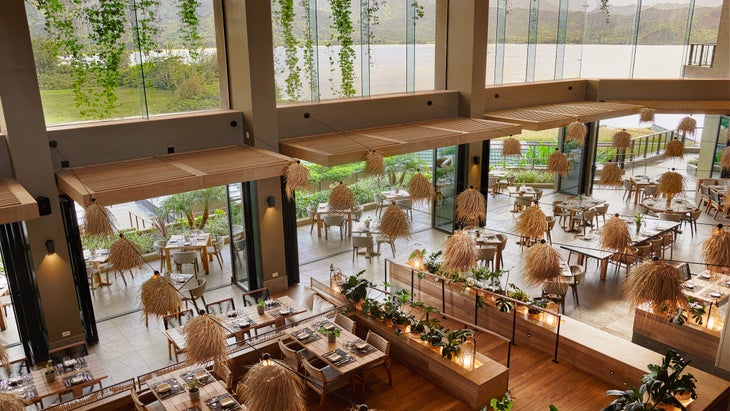 (Photo: Mikkel Vang)
(Photo: Mikkel Vang)
In the Kitchen: Restaurant menus celebrate local ingredients and the property’s gardens supply fresh produce.
Get involved: A unique membership loyalty program allows guests to earn “Give Back” cash to fund environmental and social causes, from protecting the wilderness to wind power projects.
Thoughtful Details: Wildlife-friendly outdoor lighting during sea turtle season, e-bikes for guests, wooden key cards, in-room filtered water taps, and a small hourglass-style timer to help you monitor your time spent using water in the shower.
Check Availability at 1 Hotel Hanalei Bay
5. Post Ranch Inn (Big Sur, California)
Positioned high atop the cliffs of Big Sur, Post Ranch Inn has been a steward of the land since opening its doors in 1992.
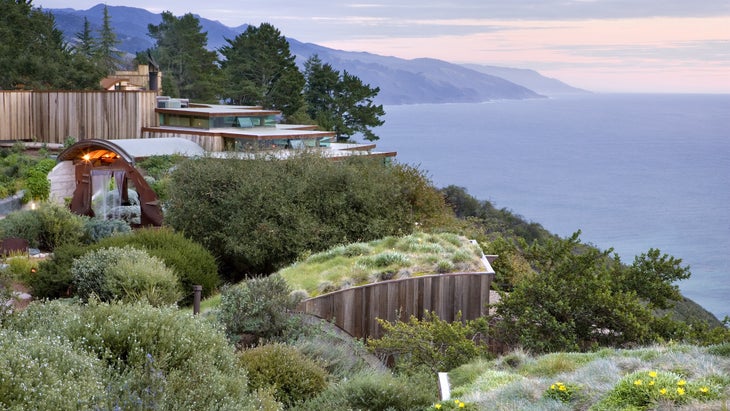 (Photo: Kodiak Greenwood)
(Photo: Kodiak Greenwood)
The Grounds: In building the structures on the 100-acre property, every environmental aspect was carefully considered, from the earth-sheltered guesthouses that capture passive heating and cooling to the small footprint of the stilted tree houses that protect the fragile root systems of ancient redwood and oak trees.
Eco Efforts: A founding member of Beyond Green’s global portfolio of hotels and resorts, the property is committed to energy and water efficiency. No single-use plastic is found anywhere on the property, with water bottled into renewable glass bottles, and organic and biodegradable bath amenities stocked in large-format refillable vessels. Low-emitting materials and low and zero-VOC paints are used throughout the resort for indoor air quality management and reducing indoor air contaminants.
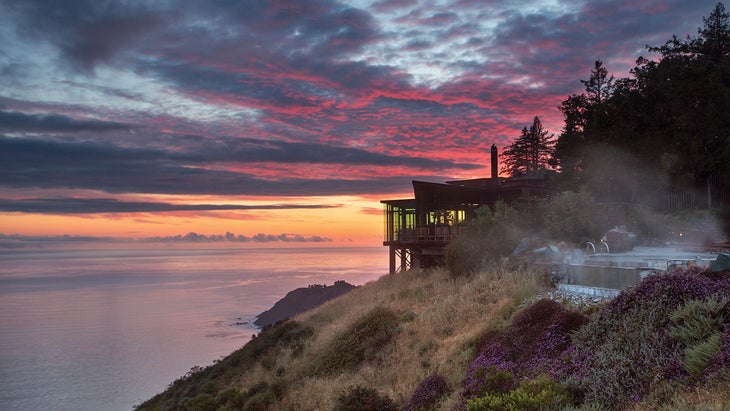 (Photo: Kodiak Greenwood)
(Photo: Kodiak Greenwood)
Wild Wellness: Self-care activities are plentiful, with morning yoga, forest meditation and sound journey classes, guided nature hikes, and more. Craving a seaside soak? A therapeutic jade stone pool and meditation pool, along with award-winning spa treatments, caters to guests’ rejuvenation needs.
In the Kitchen: The on-site chef’s garden supplies the Sierra Mar restaurant with fresh ingredients that guests can explore through edible garden tours.
Get Involved: The grounds provide a habitat for many endangered species, and Post Ranch Inn is committed to land preservation through activities that include conservation, forest management, habitat protection, and guest education.
Thoughtful Details: Through a partnership with Zero Foodprint, one percent of the property’s food revenue supports regenerative agriculture farm projects.
Check Availability at Post Ranch Inn
6. Islas Secas (Panama)
This private hideaway, nestled in a 14-island archipelago 20 miles off Panama’s Pacific coast, combines untouched natural land and seascape with sustainable hospitality.
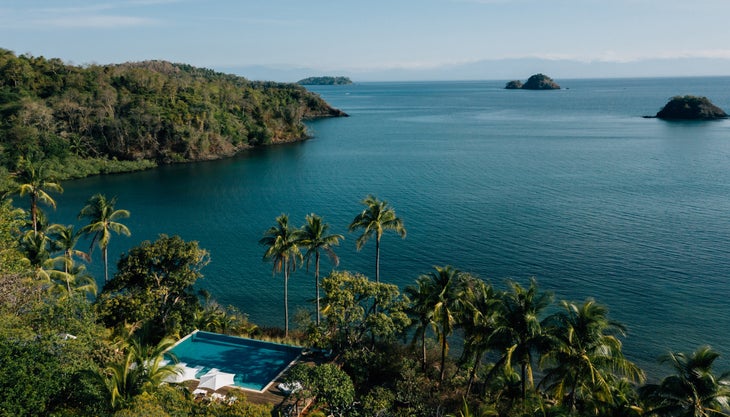 (Photo: Islas Secas)
(Photo: Islas Secas)
The Grounds: A biodiversity hotspot, Islas Secas’s location is home to an abundance of species. Just an hour boat ride away at the Coiba National Park, a UNESCO World Heritage Site, you’ll find one of the largest coral reef systems in the Eastern Tropical Pacific. Dedicated to conservation, the privately funded Islas Secas Foundation has developed research programs that reflect its commitment to the preservation of the archipelago.
Eco Efforts: With an environment-first ethos, embeds a low-impact mindset across its operations, from the property’s electricity that is 100 percent generated by renewable solar, to wastewater that is entirely reclaimed, treated, and reused for irrigation to minimize impact on the groundwater supply. Fuel use from the resort’s private plane and excursion boats is offset through a carbon program to fund restoration initiatives. Inspired by traditional Panamanian design, the eco-friendly construction paid close attention to relying on materials and building techniques that are minimally invasive to the environment, including certified sustainable wood and fallen trees repurposed into furniture. Additionally, lava stone ceilings complement the property’s recycled organic textiles, marine-inspired ceramics, and handmade traditional artworks by local artists.
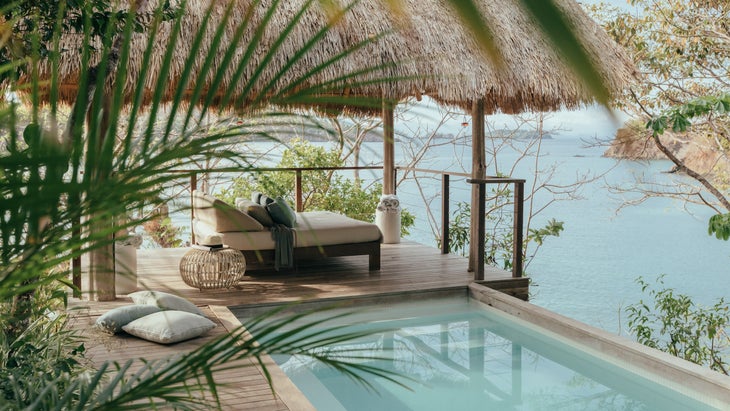 (Photo: Islas Secas)
(Photo: Islas Secas)
Wild Wellness: Picture daily yoga sessions in various scenic locations, and an open-to-the-elements wellness spa offering a variety of therapies including relaxation zones, sound baths, and bodywork.
In the Kitchen: A sea-to-table approach informs thee daily menu and honors Panama’s culinary heritage. A hundred percent of food waste is composted for fertilizer resulting in a zero-waste circular system.
Thoughtful Details: Reef-safe sunscreen, personalized aromatherapy kits, and a curated beach kit are provided for guest use.
Check Availability at Islas Secas
7. Nimmo Bay Wilderness Resort (Great Bear Rainforest, British Columbia)
This intimate family-owned wilderness resort treads as lightly on the environment as possible while giving back more than it takes.
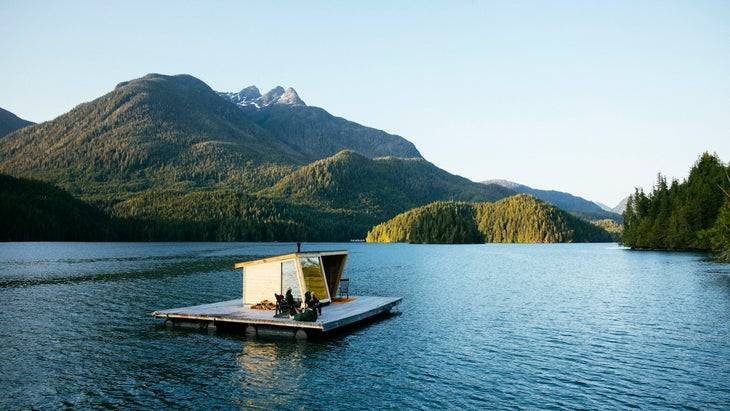 (Photo: Jeremy Koreski)
(Photo: Jeremy Koreski)
The Grounds: Tucked away on the shores of the Pacific Ocean in the heart of Canada’s Great Bear Rainforest, the resort at Nimmo Bay is committed to ethical wildlife practices and has been at the forefront of conservation initiatives, including playing a pivotal role in the ban on the trophy hunting of grizzly bears in the province.
Eco Efforts: The resort’s eco-friendly innovation dates back to the 80s, when it first opened its doors, and continues to be as important as ever as it closely monitors its carbon footprint and keeps it to a minimum. Fueled by streams and waterfalls, a water-powered electricity system generates the majority of the resort’s power needs, while a waste water management system allows grey and black water to be converted into clean water suitable for re-entry back into the ecosystem. While travel to and from the property via seaplane is currently an unavoidable source of emissions, set arrival and departure dates help minimize impact, and carbon that cannot be further reduced is offset through various reduction and conservation projects.
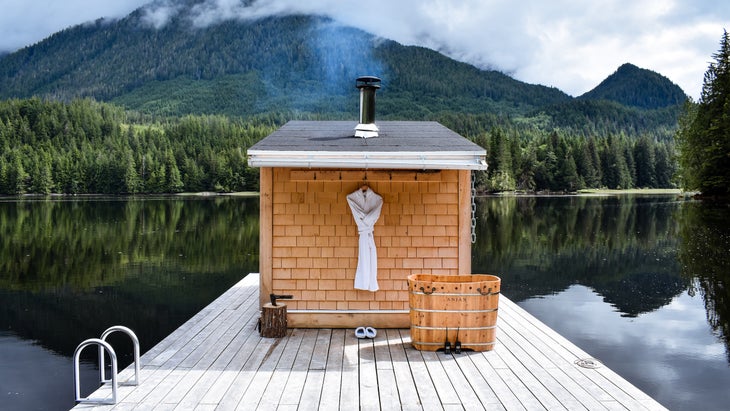 (Photo: Jeremy Koreski)
(Photo: Jeremy Koreski)
Wild Wellness: Slow rituals inform the bespoke wellness offerings, including multi-sensory outdoor experiences such as floating saunas, forest massage, sound baths in the bay, and a soak in the cedar hot tubs at the base of a waterfall. Want to take it to the next level? The “Wellness within the Wild” trip enhancement turns a visit to the resort into a multi-day personally curated wellness retreat, allowing guests to go beyond the standard menu with a curated holistic experience that combines bodywork, guided introspection, meditation, and wilderness-based wellness experiences.
In the Kitchen: Ingredients are sustainably sourced, focusing on foraged wild foods, sustainable seafood from its backyard, and produce that can be traced to the hands that sowed the seeds.
Get Involved: Care to dive for your dinner? All resort chefs are skilled free divers, who lead guests on a full-day culinary experience of diving for urchin and sea cucumber, pulling prawn and crab traps, and dining at a remote cookout.
Check Availability at Nimmo Bay
8. Tierra Patagonia (Chile)
Committed to being a model of responsible tourism, Tierra Patagonia overlooks the Torres del Paine National Park and offers guests an intentional, low-impact stay rooted in a zero-footprint strategy.
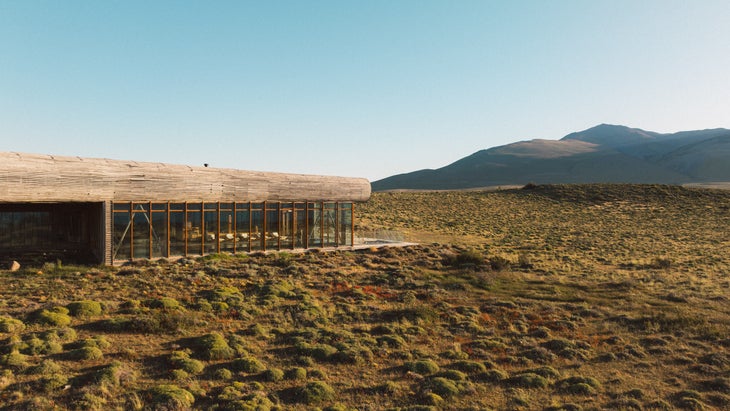 default (Photo: Tierra Patagonia)
default (Photo: Tierra Patagonia)
The Grounds: Constructed from sustainably-sourced lenga wood, this cozy refuge is designed to both protect from the harsh elements and blend into the landscape, minimizing visual distraction. In a bid to also minimize environmental impact during construction, all on-site vegetation was temporarily removed and nurtured in a greenhouse before being replanted upon completion. As a result, guests are rewarded with frequent visits from the native wildlife. A commitment to the environment has led to a number of measures focused on preserving the land, vegetation, and wildlife with cleanup initiatives and a significant reforestation program that seeks to plant one million trees in Patagonia’s national parks.
Eco Efforts: The property utilizes solar panels and energy-efficient lighting while closely managing thermal efficiency to reduce energy consumption. It’s also designed to optimize natural resources with floor-to-ceiling windows maximizing natural light and reducing reliance on artificial lighting. Water is sourced from a private well, and water management efforts include collecting rainwater and treating grey water for irrigation. Efforts to reduce waste across the property has seen single-use plastic replaced with reusable and compostable alternatives, including large format refillable bath amenities, reusable water bottles and laundry bags, biodegradable food wrapping, compostable room key cards, and more.
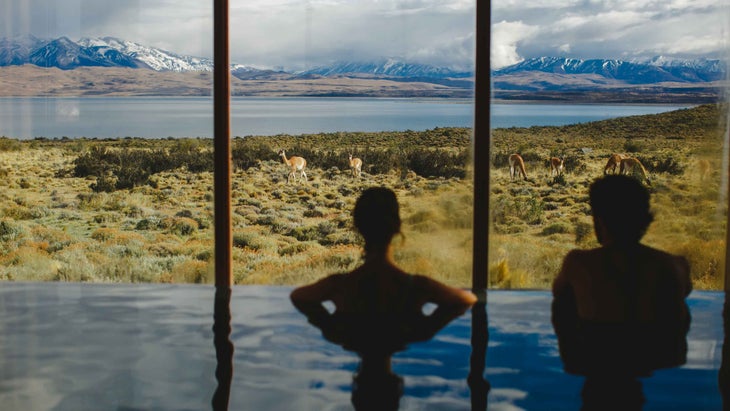 (Photo: Tierra Patagonia)
(Photo: Tierra Patagonia)
Wild Wellness: At the spa, with its towering glass walls, guests can take in the views and even spot grazing guanacos (a close relative of the llama) while relaxing in the pool. Restore your prana by indulging in treatments that use locally sourced plant life—including calafate, maqui, and Chilean laurel—and tap into the healing properties of local herbs.
Get Outside: Guests can venture out into the region’s vast landscapes to discover the rich biodiversity and untamed beauty through a variety of guided excursions on two feet, two wheels, by boat, or even on horseback.
Thoughtful Details: A thoughtfully curated reading corner gives guests the opportunity to learn more about the region and its local culture.
Check Availability at Tierra Patagonia
9. Playa Viva (Juluchuca, Mexico)
Sitting at the base of the Sierra Madre Mountains on the Pacific Coast of Mexico, Playa Viva brings a purpose-driven approach to hospitality and prides itself on offering guests an experience that aligns with its values.
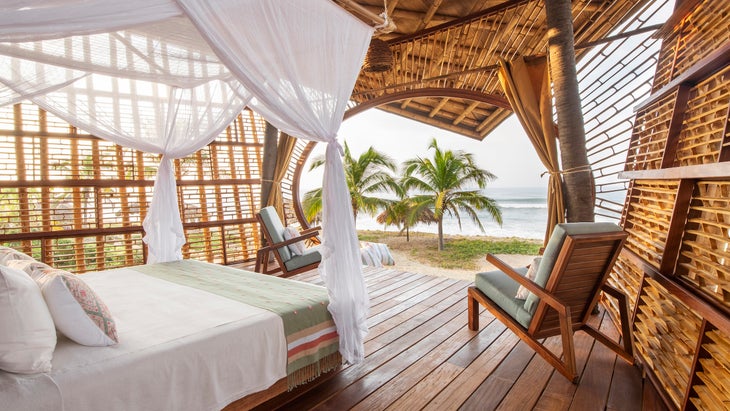 (Photo: AVABLU)
(Photo: AVABLU)
The Grounds: With nearly a mile of private beach and 200 acres of unspoiled nature reserve for guests to explore, this property is run entirely off-grid—generating 100 percent of its energy from solar power. The 20 treehouse rooms were built sustainably using renewable materials harvested on site, incorporate smart water conservation measures, and leverage design fixtures made by local artisans. Through a partnership with TierraSphere, the hotel is advancing its ReSiMar regeneration initiative in the Juluchuca watershed. Together with local communities, it’s also working to eradicate environmental degradation, with a goal of restoring more than 350 hectares of land to produce high-value food products, enhance biodiversity, improve soil health, and sequester carbon.
Eco Efforts: As a B Corp-certified regenerative resort, Playa Viva is an example of a low-impact stay that offers an extensive regenerative experience, with a commitment to restoring the landscape and local communities. The resort addresses limited economic opportunities through its ReSiMar program, creating new agriculture jobs for community members, boosting the local economy. It also supports a women’s cooperative in producing organic consumer products, such as superfood powders and medicinal teas. Each year, thousands of Olive Ridley turtles and dozens of endangered Green and Leatherback turtles come to the shores of the resort to lay their eggs. To help protect and preserve turtle species, Playa Viva supports the onsite sanctuary, La Tortuga Viva, that relocates turtle eggs to safety, successfully releasing more than 450,000 baby sea turtles since 2010.
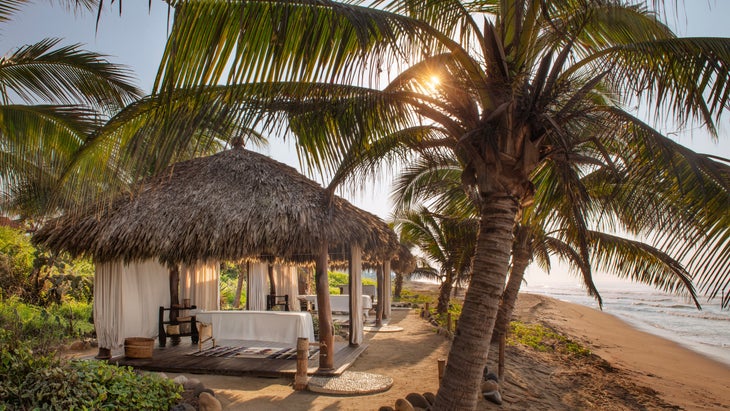 (Photo: AVABLU)
(Photo: AVABLU)
Wild Wellness: Working with the belief that we need wild places to regenerate our souls, the property offers plentiful wellness activities with yoga classes in the property’s oceanside shalas and massage treatments in beachside palapas.
In the Kitchen: A thriving organic garden supplies the farm-to-table cuisine with a variety of seasonal vegetables and seeds. Guests are invited to stroll through both the garden and the orchard and pick their own fruit. The healthy Mexican menu is changed daily, and guests can expect a variety of dishes, including swordfish ceviche, sopes, and hot and cold soups.
Get Involved: There’s no shortage of things to do. Experiences include farm tours, wildlife excursions, and local immersion activities that give guests the opportunity to engage with the local environment and community in a way that honors them. There’s the opportunity to participate in the release of baby hatchlings and experience the sense of awe that comes from witnessing them make their way to the water.
Check Availability at Playa Viva
10. Singita Kruger National Park (Kruger Park, South Africa)
Positioned on 33,000 acres in the southeastern reaches of the Kruger National Park, you’ll find Lebombo Lodge and Sweni Lodge, accommodations that make up the Singita Kruger National Park collection.
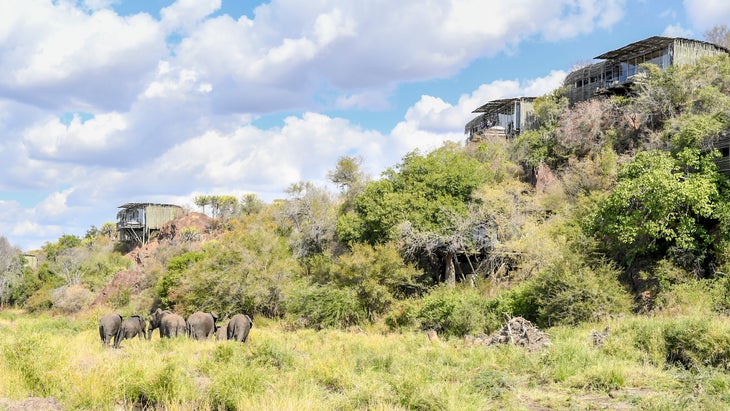 (Photo: Ross Couper)
(Photo: Ross Couper)
The Grounds: This isolated stretch of wilderness is especially well-known for its concentration of the “Big 5″—aka lions, leopards, rhinoceros, elephant, and African buffalo (especially prides of lions). With conservation at its core, Singita has been helping to preserve Africa’s wildlife for the last 30 years, and through its non-profit partner, the Singita Lowveld Trust, it has been focused on various partnerships and programs that strive to build a future in which people and nature can thrive in harmony.
Eco Efforts: The properties employ solar power and renewable energy, and strive to be as fuel-efficient as possible by aiming to be a part of the electric vehicle revolution. Where emissions are unavoidable, Singita funds various carbon-offset projects, such as the protection of threatened forests and projects aimed at making cook stoves more efficient and eco-friendly. Other sustainable practices include low-impact construction using renewable materials, conscious water consumption with efforts directed toward the ongoing monitoring of borehole and aquifer health, and responsible waste management that minimizes waste sent to landfill. The company is also a fellow of The Long Run sustainability program, focused on positive impact tourism through a 4C framework (Conservation, Community, Culture and Commerce), and is working toward aligning all of its properties with the framework’s approach to sustainability.
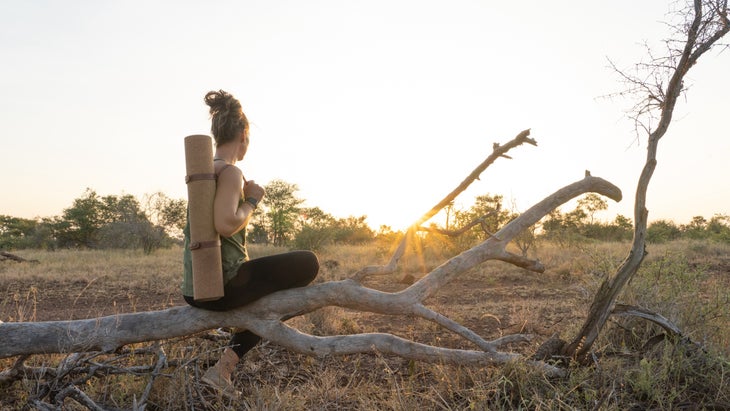 (Photo: Ross Couper)
(Photo: Ross Couper)
Wild Wellness: Wellness treatments leverage indigenous wisdom and unlock nature’s healing power. You’ll find a yoga mat in each suite, accompanied by an instructional card that guides you through a relaxing sequence of movement and mindfulness.
Get Outside: Guests are offered exceptional safari experiences with game drives and guided safari walks.
Check Availability at Singita
11. Longitude 131 (Yulara, Australia)
Surrounded by the rugged red dunes in the outback of Uluru-Kata Tjuta National Park, the Longitude 131 luxury tents offer unparalleled and expansive views of what’s known as the “Red Centre.”
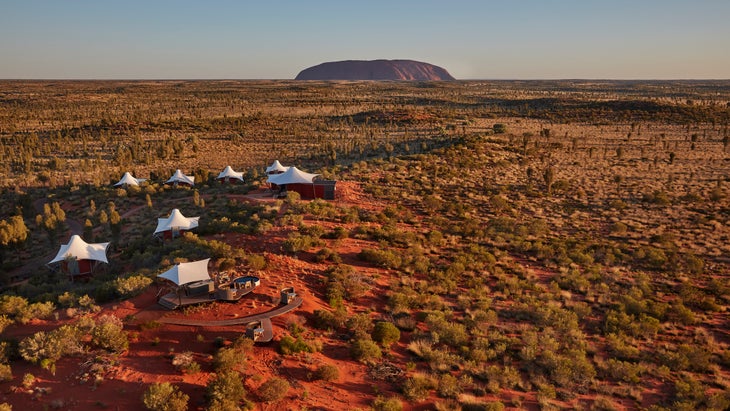 (Photo: Baillie Lodges)
(Photo: Baillie Lodges)
The Grounds: Although the desert surroundings may appear uninhabited, it is, in fact, a thriving ecosystem home to a variety of wildlife. The desert camp has been carefully designed to have minimal impact on the delicate natural environment, and can be easily dismantled if required, restoring the site to its original state with minimal remediation.
Eco Efforts: Natural stone insulates the tent floors, enhancing cooling in the summer and retaining warmth in the winter, while the positioning of the tents minimizes heat load on window glazing. The resort is fitted with solar panels on the roof of the Dune House and guest tents to provide hot water, and the pool is heated using energy efficient heat-pump technology. The camp also taps into solar projects commissioned by Voyages Indigenous Tourism Australia. Guests’ water usage is minimized through water-efficient fittings, and forgoing bath tubs in favor of generously-sized showers helps preserve precious water in the desert environment. To minimize unnecessary waste, single-use plastic is mindfully reduced, with things such as bath amenities made available in refillable vessels.
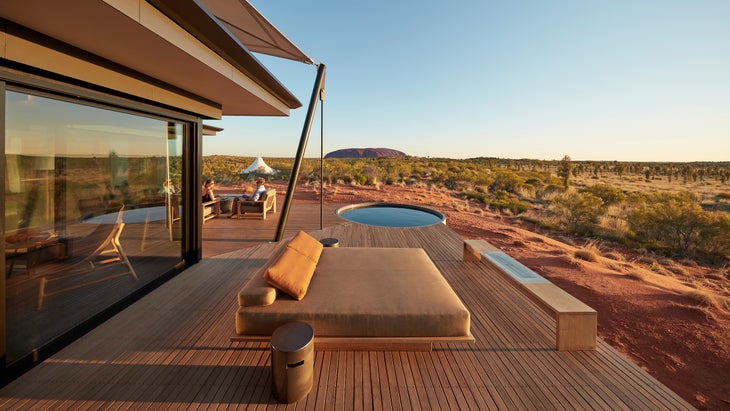
Wild Wellness: The camp spa reflects the design of a traditional Aboriginal shelter, or wiltja, offering guests a cool sanctuary. Here you can indulge in relaxing and rejuvenating treatments that lean into the region’s resources of native beauty products, such as Kakadu plum, desert lime, Australian yellow clay, and nutrient-rich desert salts. A balm made by Aboriginal Ngangkari traditional healers from the leaves of the scented emu bush and olive oil is a staple used in many of the treatments at the spa.
Get Outside: Guests can explore what the Red Centre has to offer through activities including outback cycling, scenic plane flights, and guided adventures that offer a glimpse into its Aboriginal heritage.
Check Availability at Longitude 131
12. Patina Maldives (Fari Islands, Maldives)
Set in the Fari Islands archipelago in North Malé Atoll, Patina Maldives leans into environmental stewardship and sustainable tourism practices that earned the resort an EarthCheck Silver Certification and recognition as a Green Collection hotel.
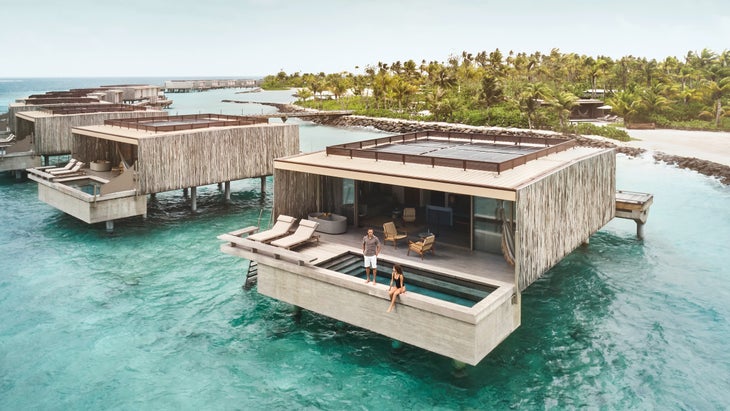 (Photo: Patina Maldives)
(Photo: Patina Maldives)
The Grounds: The corals that inhabit the Indian Ocean are top priority here. A first-of-its-kind coral propagation initiative has enabled the planting of more than 4,000 coral fragments that are nurturing dozens of fish species.
Eco Efforts: Strategic design decisions, such as forgoing conventional thatched roof structures in favor of flat roofs, allowed for ease of mounting solar panels. A solar energy expansion is on the horizon that will see the solar contribution increase from 15 to 50 percent. The resort sets ambitious goals to tackle marine plastic pollution through a number of initiatives, including island cleanups that have collected more than 3,400 kg of waste (the majority of which is plastic). Through its Ghost Net Project, the property has recovered more than 2,000 kg of discarded fishing gear that poses a significant threat to marine life. Other conservation efforts actively supported by the resort include a turtle identification and monitoring initiative aimed at fostering a greater understanding of the species in order to protect them.
Wild Wellness: The resort boasts unique wellness treatments and modalities, including bodywork that targets the activation of the vagus nerve (to regulate stress, rest, and digestion), the practice of Watsu (a form of therapeutic aquatic bodywork), a floatation zone, and more.
In the Kitchen: The resort’s organic permaculture garden cultivates fresh pesticide-free produce and supplies its plant-based restaurant. All food waste is turned into organic fertilizer through biodigesters.
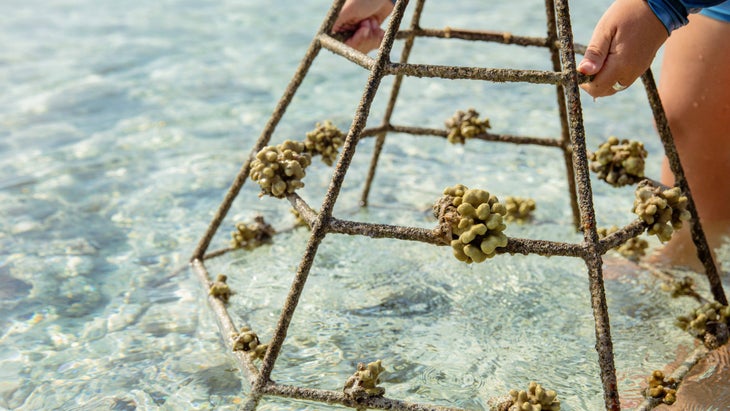 (Photo: Patina Maldives)
(Photo: Patina Maldives)
Get Involved: Through engaging workshops led by the resort’s resident marine biologist, guests are invited to learn about marine conservation while upcycling nets into souvenir bracelets that serve as a symbol of a positive impact made on the oceans. Want to play a unique part in helping to bolster coral populations? Support these efforts by adopting a coral frame, and feel a deeper connection to nature.
Check Availability at Patina Maldives
13. Misool Resort (Raja Ampat, Indonesia)
Located in remote Raja Ampat, Indonesia, on the site of a former shark-finning camp, Misool sits tucked away in an archipelago of uninhabited islands that are home to some of the most pristine reef systems on Earth.
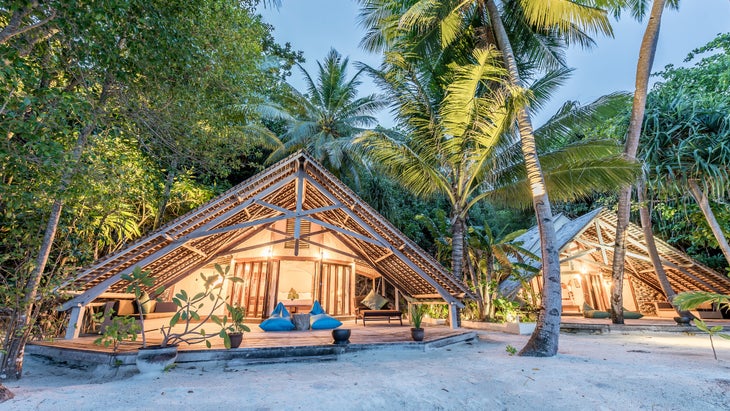 (Photo: Misool)
(Photo: Misool)
The Grounds: Through its conservationist ethos, this tropical hideaway has established sustainability policies to ensure that it not only minimizes its negative impact on the surrounding environment but maximizes its positive impact. The Misool Marine Reserve, a 300,000-acre sanctuary, is made up of two “No-Take Zones” inside which all extractive practices are banned.
Eco Efforts: Relying entirely on reclaimed wood and locally sourced grass for the traditional alang-alang thatch roofing, the construction of the property was done environmentally consciously and preserved traditional skills. A solar energy system reduces onsite diesel consumption, with renewable energy powering two-thirds of its operations in season. Water conservation is top of mind, with more than half of it originating from rainwater collection and the remainder from desalination units. Grey and black water is treated through wastewater gardens, an artificial wetland that processes wastewater using bacteria which occurs naturally on the roots of plants. Through the resort’s charity arm, several programs help safeguard biodiversity in Raja Ampat, including a reef restoration project that restored over 1,300 square meters of reef in 2023, a shark rewilding project that reintroduced endangered leopard sharks into the ecosystem, and a manta research and conservation project.
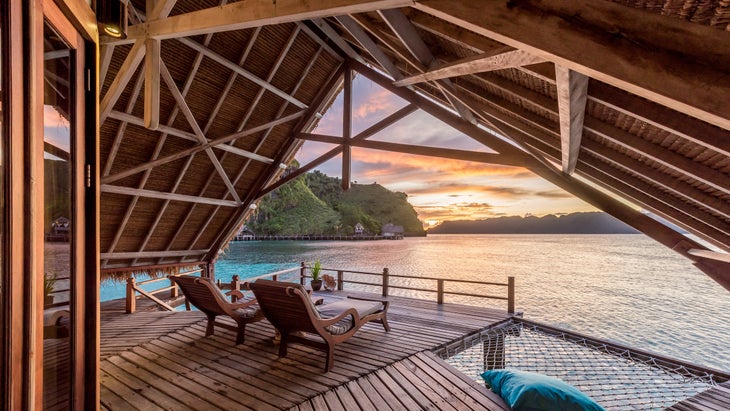 (Photo: Misool)
(Photo: Misool)
Wild Wellness: Spa treatments incorporate traditional Indonesian techniques and local ingredients, such as Kemiri nuts and freshly harvested banana leaves for body wraps. Want to try something different? Its signature batu laga massage uses a heated operculum from a giant turban shell.
In the Kitchen: The fish on the menu is sustainably line-caught outside of thee reserve with zero bycatch, and all fresh food is sourced from the local area as well as the hotel’s own hydroponic farm. All organic waste is composted on site and used in the gardens.
Get Involved: Recognizing that guests play a critical role in preserving habitats, the resort prioritizes education on how to respectfully interact with endangered species and the fragile marine ecosystems.
Thoughtful Details: Guests are provided with biodegradable bath products.
Check Availability at Misool

